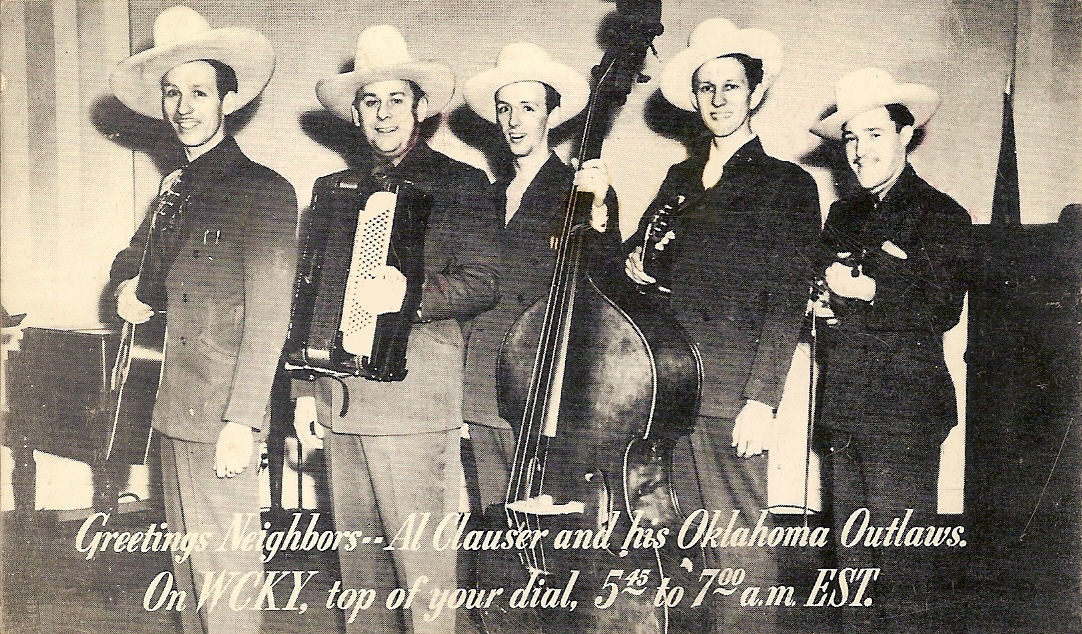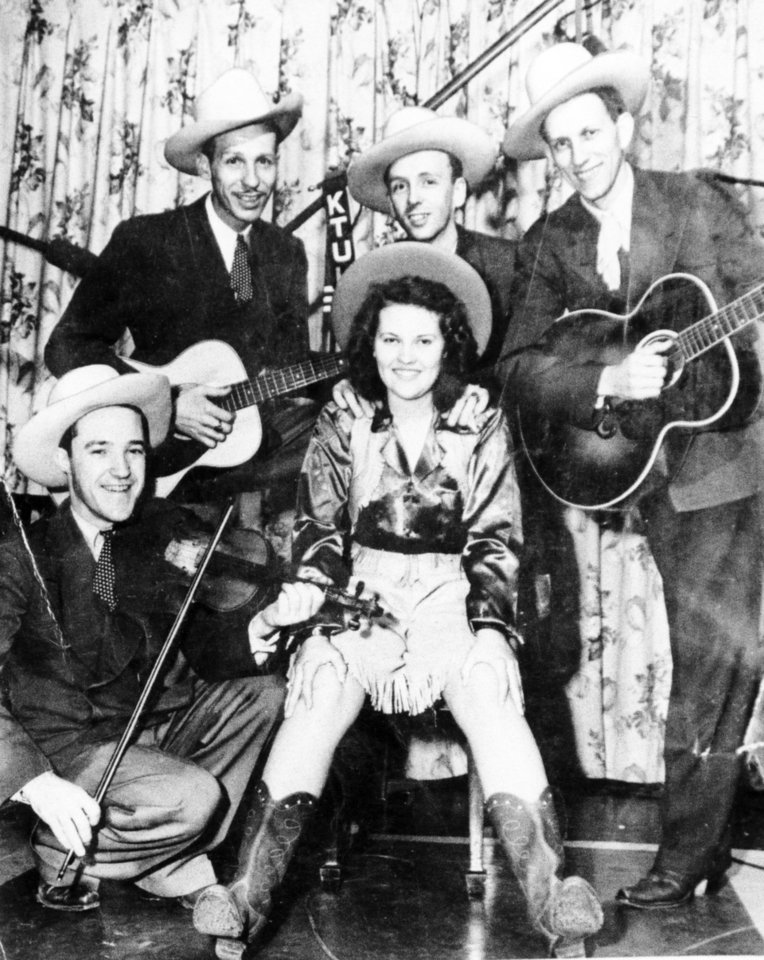Al Clauser and His Oklahoma Outlaws and Patti Page
Another blog article started long ago, July 26, 2021, but never quite finished, until now.
In 1982, Oklahoma was celebrating its 75th anniversary, the Diamond Jubilee of statehood, and it was one of the focuses (along with Korea) of the Smithsonian Institution's 1982 Festival of American Folklife. The program book for the festival is available at the Internet Archive.
The 1982 festival's book includes a Guy Logsdon article on western swing. In this two-page essay, Logsdon puts the spotlight on Johnnie Lee Wills, Hank Thompson, and Leon McAuliffe, all still actively performing at the time, all based in or near Tulsa. Logsdon made some insightful comments on the musical distinctives of western swing:
A cultural blend of musical styles, western swing has one primary characteristic - a danceable beat. While country and bluegrass music primarily emerged as listening traditions, the principal audience for western swing is a dancing crowd. If the listeners on a Saturday night outnumber the dancers, the band has failed at playing good western swing....The western swing band requires fiddles, drums, a bass fiddle, horns, a steel guitar and a rhythm guitar, performing a strong heavy rhythmic style. The voicing of the fiddles provides the distinctive sound for each band: Bob Wills voiced his fiddles to play harmony above the lead fiddle; Leon McAuliffe voiced his below the lead to simulate a saxophone-trombone effect; Spade Cooley, an Oklahoman who had a popular California band, used arrangements which voiced the fiddles above the lead, punctuating the music with a strong staccato sound. The sound and the quality of western swing music was determined by the leader. Musicians "play better" behind an outstanding leader, and the greatest of the leaders have made Tulsa their home.
Logsdon also mentioned Al Clauser, bandleader of the Oklahoma Outlaws, a band that started in Peoria, Illinois, moved to Des Moines, Iowa, Cincinnati, and Rock Island, before landing in Tulsa in 1942, performing on KTUL radio (AM 1430) and at the dance hall at Crystal City Amusement Park (on Southwest Boulevard in Red Fork, now the site of the Crystal City shopping center).
In 1937, while broadcasting on WHO in Des Moines, the Oklahoma Outlaws were invited by Gene Autry to be in his film Rootin' Tootin' Rhythm. Tulsa music legend Rocky Frisco, created the Wikipedia page for Al Clauser and wrote of the Hollywood trip:
Al Clauser & His Oklahoma Outlaws appeared in an early Gene Autry film, "Rootin' Tootin' Rhythm," and recorded a dozen tracks for ARC in the 1930s. When Gene called to ask Al to bring the band to Hollywood to be in the movie, WHO sportscaster, Ronald Reagan, asked Al if he could come along on the Band Bus and Al said that would be fine. Reagan's first experience on a movie set was during the shooting of this film. In the 1970's and 80's, the office of Al's recording studio had an enormous photograph of Reagan with Reagan's thank-you note for his "start in the business" penned on it in ballpoint.
Rocky Frisco was assistant engineer at Clauser's Alvera studio in Prue, Oklahoma.
TulsaTVMemories has stills from Rootin' Tootin' Rhythm featuring Al Clauser and his band.
In November 1940, the Oklahoma Outlaws debuted on WCKY Cincinnati's "Hot Coffee" early morning show; hiring staff musicians got WCKY out of trouble with the musicians' union.

It's not entirely clear, but it may be that the Oklahoma Outlaws were based in Cincinnati, while they broadcast a daily 15 minute show on CBS Radio Network. By May 1941, they were heard on 31 stations nationwide. But during the summer of 1942, the band was performing three nights a week in Tulsa at the Casa Loma Terrace at Crystal City Park and was heard daily on KTUL radio.

The Oklahoma Outlaws daily radio show was sponsored by Page Milk Company, and their girl singer, Clara Ann Fowler, used the sponsor's name as the basis of her stage name: Patti Page. Born in Claremore, Patti Page spent much of her youth west of the river in Tulsa, where she attended Clinton Junior High and Webster High School.
Clauser became a broadcast engineer at KTUL-TV, serving as studio supervisor and chief engineer. In the 1970s, Clauser played sidekick Uncle Zeke on KTUL's afternoon kids' show, Uncle Zeb's Cartoon Camp.
That festival handbook also has (on pages 30-34) a collection of Oklahoma recipes from various ethnic communities, presented by Sue Manos: Czech kolaches, Mexican tamales, German plum soup, Italian Easter bread casadele and Easter pie, Vietnamese cha gio (meat rolls), Indian fry bread, Cherokee grape dumplings, "Afro-American" fried okra and ham, "Anglo" chicken fried steak, cream gravy, and biscuits.
The 1982 Festival of American Folklife handbook also includes essays by Guy Logsdon on Woody Guthrie, Oklahoma folkways, and shape-note singing; by George Carney about pipelining in the oil fields; and by Clydia and Fred Nahwooksy on Indian crafts and dancing and quarterhorse match racing.
RELATED:
The Oklahoma Department of Tourism has an itinerary of places relating to Patti Page's life and career.
In 2011, Paul W. Dennis at My Kind of Country wrote profile of Patti Page and explained how she began working as her own backup singer:
Patti's first single, "Confess" came out during one of the Petrillo strikes in 1947, meaning that background singers were not available for recording purposes. Mercury thought that Patti's voice was sufficiently versatile that she could do her own harmony backgrounds, and so developed the practice of Patti overdubbing her own harmony vocals on record, the first artist with which this was done. "Confess" was one of three top twenty records she would chart from 1947-1949.
PragueFrank has a comprehensive discography of Al Clauser and the Oklahoma Outlaws. Patti Page did the vocals on "Never Pretend" from a late 1945, early 1946 recording session; it's on a Krazy Kat reissue: Al Clauser and the Oklahoma Outlaws: Oklahoma Stomp: Hot Western Swing 1937-1948
0 TrackBacks
Listed below are links to blogs that reference this entry: Al Clauser and His Oklahoma Outlaws and Patti Page.
TrackBack URL for this entry: https://www.batesline.com/cgi-bin/mt/mt-tb.cgi/8851